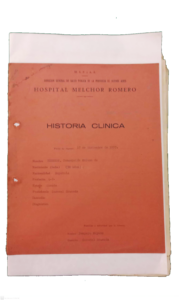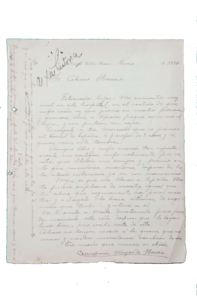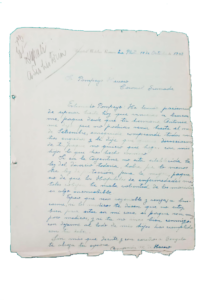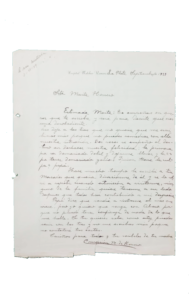During the process of preservation and conservation of the Clinical Histories, we found several documents of interest. In particular, we present one that is fundamental to our work: the letters that were not sent.
Hundreds of letters written by people who were hospitalised, to their relatives, friends, loved ones, to the judiciary, to Presidents, etc. These are of incalculable and invaluable value as they allow us to know the feelings, thoughts and desires of the people who were there and the political, social and cultural context.
These letters are archived, marked “to their history”, in the Clinical Histories, which means that they never reached their destination. We understand that, in some cases, they were used as a tool for the study of people, a way of accessing, disrespectfully, their most intimate feelings, subjugating all intimacy. Others are complaints about the functioning of the hospital, the treatment, the treatments, letters begging not to receive “those injections that hurt so much”, denouncing the food, hygiene, etc.
It is the story of people who died or survived one of the worst institutions of confinement, a madhouse. We believe that recovering and making these silenced voices accessible is an act of reparation to the victims of the asylum and to the memory of our peoples.
In particular, the one we share here shows a fundamental axis: the women locked up by their husbands. Although the letter is dated 1942, she had been in the Hospital since 1937. She was 36 years old, of Spanish nationality, and at the time of her internment she lived in a town in the Province of Buenos Aires, more than 500 kilometres from the Hospital. In these letters she wrote to her children, telling them how bad she felt in the Hospital, as well as her future plans to return to Spain, since the war was over.
She also tells of wars that started in Argentina, she writes to her husband, in response to his lack of answers and her desire to divorce him, telling him “If in Argentina the law of divorce is not yet established, there will at least be another law of protection for women, because it is inconceivable that hospitals for mental illnesses should place the ill will of their husbands in the hands of their husbands”. “If the doctors tell you that I am not well enough to be in my house, it is because they are too few doctors and if you do not live well with me, by leaving me with my children, you have done your duty”.
AUTHOR OF THE TEXT
Camila Azzerboni, Pilar Arguiano, Marisol Salvador and Micaela Muñoz
NAME OF IBERARCHIVES PROJECT
Bibliography:
– Memorias Hospitalarias Dr. Alejandro Korn 1919




